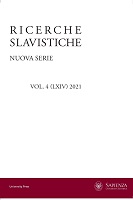Impersonal Constructions in Belarusian and closely Related Languages: A Typological and Areal Account
Impersonal Constructions in Belarusian and closely Related Languages: A Typological and Areal Account
Author(s): Lidia Federica MazzitelliSubject(s): Syntax, Semantics, Eastern Slavic Languages
Published by: SAPIENZA UNIVERSITÀ EDITRICE
Keywords: impersonality; language contact; non-canonical subjects; linguistic typology; semantics; syntax;
Summary/Abstract: This article discusses the impersonal constructions of Belarusian and four languages - Russian, Ukrainian, Polish and Lithuanian - that are closely related to it both genetically and geographically. The article illustrates the main types of impersonal constructions found in these languages: constructions with subject in the dative, accusative and instrumental; constructions with indefinite subject in the third person plural; participial constructions in -n/-t and -m/-t without agreement. Following the typological classification of impersonal constructions proposed by Malchukov - Ogawa (2011) and its application to Russian illustrated in Schlund (2018), impersonality in these languages is defined as a deviation from the prototypical features of the subject. This deviation is both formal (lack of subject to the nominative case; absence of predicate agreement) and functional (non-agentic, animate, referential or topical subject): the formal non-canonicity of the subject in impersonal constructions is analysed as arising from its formal non-canonicity. The article shows that the definition of impersonality as a deviation from the prototypical characteristics of the subject applies perfectly to all types of impersonal constructions in the analysed languages. The only exception, represented by reflexive constructions with an agent expressed in Ukrainian (ucr. mater''ju myetsja dytynu 'the child (ACC) is washed by the mother') and participial constructions with an agent expressed in Ukrainian and Belarusian (blr. chatu dzedam pastaŭlena 'the house (ACC) was built by the grandfather'), is explained as a case of syntactic contamination by the passive.
Journal: RICERCHE SLAVISTICHE. NUOVA SERIE
- Issue Year: 4/2021
- Issue No: 64
- Page Range: 277-310
- Page Count: 34
- Language: English

